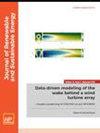An in-depth exploration of recent advances and promising outlooks in biogas production
IF 1.9
4区 工程技术
Q4 ENERGY & FUELS
引用次数: 0
Abstract
Biogas is a product composed of a mixture of gases resulting from the biological decomposition of organic material, consisting primarily of methane gas and carbon dioxide, besides smaller amounts of other gases. The current study aims to comprehensively analyze waste-based biogas production to ensure sustainability in the biofuel production process. An advanced systematic bibliometric analysis using keywords, co-citations, and bibliographic coupling analysis was performed on 641 peer-reviewed articles from Web of Science to conclude this goal further. This analysis covers the period from 2000 to 2022, a little more than 20 years. The methodology used reveals several themes that have been identified and addressed in the articles: (1) the importance of the topic in academia by country in which they were analyzed; (2) sectors contributing to biofuel production; (3) equipment used in biofuel production; (4) the most cited waste sources in the database; (5) application purpose of biogas; (6) relevance of other energy sources; (7) areas of interest where biofuels are used; and (8) a comparison between the energy production capacity and the number of publications on the topic by country. Furthermore, the potentials, limitations, perspectives, and future trends highlighted to improve the production process are also considered. Therefore, the conclusion is that organic waste can be used in the sustainable production of goods with added value for society.深入探讨沼气生产的最新进展和美好前景
沼气是有机物经生物分解后产生的气体混合物,主要由甲烷气体和二氧化碳组成,此外还有少量其他气体。本研究旨在全面分析基于废物的沼气生产,以确保生物燃料生产过程的可持续性。为了进一步实现这一目标,我们对 Web of Science 中的 641 篇同行评议文章进行了先进的系统文献计量分析,使用了关键词、共同引用和文献耦合分析。该分析的时间跨度为 2000 年至 2022 年,即 20 多年。所使用的方法揭示了文章中已确定和涉及的几个主题:(1)按分析国家分列的该主题在学术界的重要性;(2)有助于生物燃料生产的部门;(3)生物燃料生产中使用的设备;(4)数据库中引用最多的废物来源;(5)沼气的应用目的;(6)其他能源的相关性;(7)使用生物燃料的相关领域;以及(8)按国家分列的能源生产能力与该主题出版物数量之间的比较。此外,还考虑了为改进生产过程而强调的潜力、局限性、前景和未来趋势。因此,结论是有机废物可用于可持续生产,为社会带来附加值。
本文章由计算机程序翻译,如有差异,请以英文原文为准。
求助全文
约1分钟内获得全文
求助全文
来源期刊

Journal of Renewable and Sustainable Energy
ENERGY & FUELS-ENERGY & FUELS
CiteScore
4.30
自引率
12.00%
发文量
122
审稿时长
4.2 months
期刊介绍:
The Journal of Renewable and Sustainable Energy (JRSE) is an interdisciplinary, peer-reviewed journal covering all areas of renewable and sustainable energy relevant to the physical science and engineering communities. The interdisciplinary approach of the publication ensures that the editors draw from researchers worldwide in a diverse range of fields.
Topics covered include:
Renewable energy economics and policy
Renewable energy resource assessment
Solar energy: photovoltaics, solar thermal energy, solar energy for fuels
Wind energy: wind farms, rotors and blades, on- and offshore wind conditions, aerodynamics, fluid dynamics
Bioenergy: biofuels, biomass conversion, artificial photosynthesis
Distributed energy generation: rooftop PV, distributed fuel cells, distributed wind, micro-hydrogen power generation
Power distribution & systems modeling: power electronics and controls, smart grid
Energy efficient buildings: smart windows, PV, wind, power management
Energy conversion: flexoelectric, piezoelectric, thermoelectric, other technologies
Energy storage: batteries, supercapacitors, hydrogen storage, other fuels
Fuel cells: proton exchange membrane cells, solid oxide cells, hybrid fuel cells, other
Marine and hydroelectric energy: dams, tides, waves, other
Transportation: alternative vehicle technologies, plug-in technologies, other
Geothermal energy
 求助内容:
求助内容: 应助结果提醒方式:
应助结果提醒方式:


